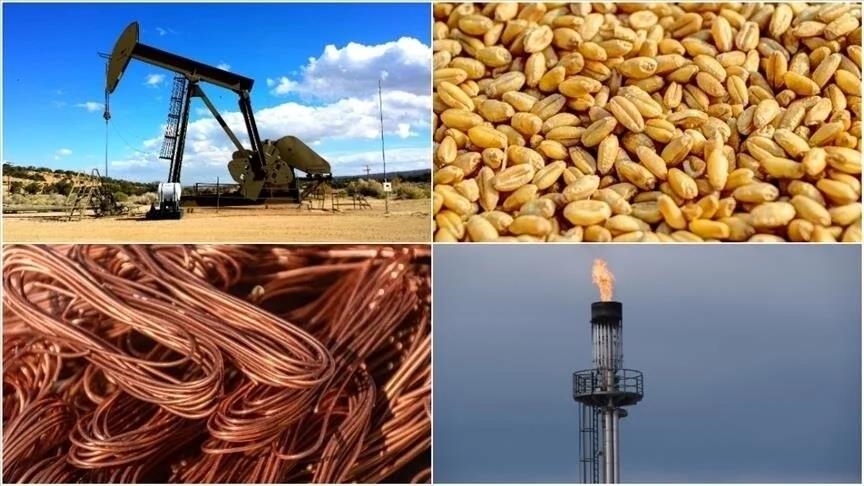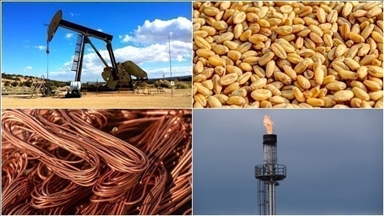Commodity markets saw upward trend last week
This comes as demand is expected to rise with start of interest rate cuts by major central banks this year

ISTANBUL
Commodities saw an upward trend last week as demand is expected to rise with the start of interest rate cuts by major central banks this year.
The upward trend stemmed from geopolitical risks and supply concerns, as well as news from China regarding increased demand in the coming months despite difficulties in the Chinese economy.
Gold prices went up on rising physical demand from Chinese households.
Meanwhile, the US Consumer Confidence Index by the Conference Board fell 0.1 points to 104.7 in March, which gave way to the increase in gold prices.
Ongoing geopolitical risks also caused gold prices to increase.
Given these developments, the ounce price of gold gained 3.1%, reaching a new peak at $2,233, while silver soared 1.1%, palladium 3%, and platinum 1.5%.
Copper prices are pushed higher with global mines ceasing production, leading to supply concerns.
Aluminum prices were affected by the dry weather in the southwestern Chinese province of Yunnan, which negatively impacted aluminum producers, resulting in reduced production levels.
Rainfall is expected to remain low in the region for two months, which could affect the pace of the planned resumption of production for aluminum smelters, analysts say.
In light of this news, copper increased 0.3%, aluminum 1.1%, lead 1.4%, whereas zinc fell 1.8%, and nickel 2.8%.
In addition to geopolitical risks, expectations that OPEC+ may continue production cuts continue to support oil prices upwards.
Concerns remain that attacks on commercial ships in the Red Sea by the Iranian-backed Houthis in response to Israel's attacks on Gaza will lead to supply disruptions.
Natural gas prices also saw an upward trend following the decline in natural gas stocks.
The barrel price of Brent crude oil climbed 2% and the natural gas traded on the New York Mercantile Exchange in British thermal units (MMBtu) rose 6.3%.
Wheat prices rose on expectations that wheat stocks would decrease in the US.
Therefore, wheat traded on the Chicago Mercantile Exchange rose 1.2% and corn 0.6%, whereas rice decreased 5.7%, and soybeans remained flat.
Concerns that sugar production will decrease in India and expectations of a production deficit also cause an increase in sugar prices.
Coffee prices soared on concerns that coffee exports in Vietnam would decline year-on-year.
Cocoa prices reached new peaks as major cocoa factories in the Ivory Coast and Ghana decided to cut or halt production due to high seed costs.
The cocoa harvest is expected to fall significantly in the Ivory Coast, which supplies approximately 45% of the world's cocoa supply.
Cocoa yields in other producer countries, such as Nigeria, also come in far behind expectations.
The intermediate cocoa harvest, starting in April, is also estimated to be lower than last year due to heat and drought negatively impacting the development of cocoa beans.
In light of these developments, cotton traded on the International Exchange fell 0.8%, while sugar hiked 3%, and coffee 2%.
As for cocoa, its price peaked at $1,080 last week, up 2.3%.
*Writing by Emir Yildirim
Anadolu Agency website contains only a portion of the news stories offered to subscribers in the AA News Broadcasting System (HAS), and in summarized form. Please contact us for subscription options.


